Whether you’re a new entrepreneur trying to win over your first 10 customers or a seasoned veteran acquiring your 10,000th, customer acquisition never stops being relevant.
But for many business owners, sales can be unpredictable, and gaining new customers can feel like a game of chance.
If you want to grow your business consistently and profitably, you need to think of customer acquisition not as an outcome but as a process—one that considers how you can systematically acquire new customers, the cost to get them through your door, and how much money each one will spend with your business.
What is customer acquisition?
Customer acquisition is the process of identifying, attracting, and converting potential customers into buyers of a company's products or services. It involves marketing strategies, sales tactics, and customer relationship management. Examples of customer acquisition include email marketing, using a CRM, and providing superior customer service.
Customer acquisition channels
Businesses use customer acquisition channels to connect with their ideal buyer personas. You can use these channels across all touchpoints of the customer journey to bring your customer acquisition methods to life.
Popular customer acquisition channels include:
- Your website
- Your blog
- Email marketing
- Events
- Organic social media
- Paid ads
- Customer support
- Referrals
The customer acquisition funnel
Whether you’re selling wholesale or direct to consumers, you need a customer acquisition strategy. Customer acquisition happens in stages, which are often visualized as a customer acquisition funnel:
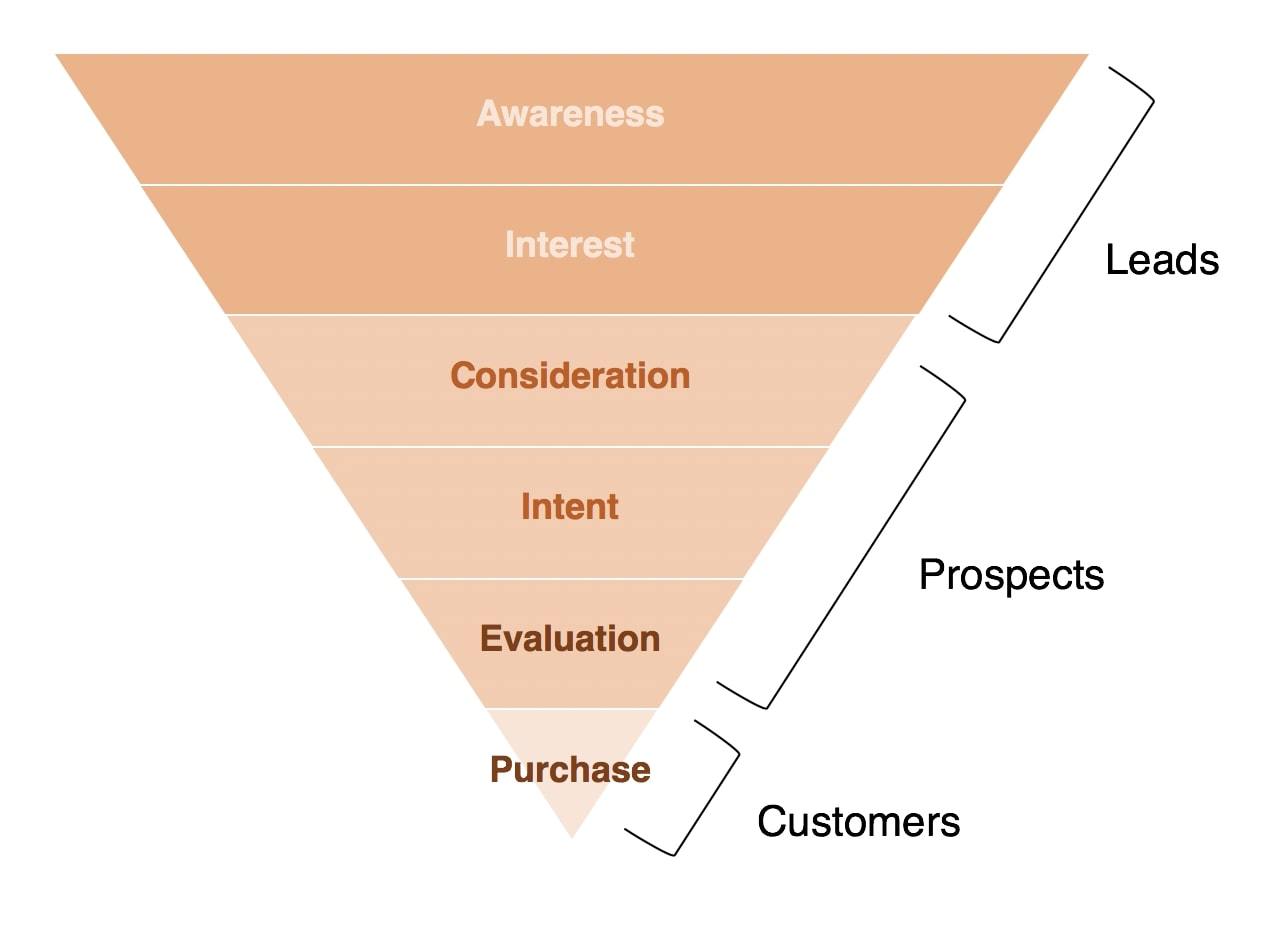
The customer acquisition funnel visualizes the journey a potential customer takes. Marketers and entrepreneurs often discuss the funnel as having three main stages:
- Top of the funnel (awareness). At this stage, your goal is to generate awareness and leads amongst your target audience. Typically, you’ll focus on a large, broad audience that may be interested in your company’s brand or products but doesn’t have a definite intent to buy. A baby brand may use the hashtag #nurserydesign on Instagram to expose its posts and products to those looking to decorate their nursery.
- Middle of the funnel (consideration). Prospective customers that move from the top of the funnel to the middle have usually taken an action, such as signing up for an email list or following your brand on social media, that shows they are considering a purchase. It is now up to you to convince them to become customers.
- Bottom of the funnel (purchase). This is the final stage a prospect goes through before they convert into a customer. Usually, they have taken some action that indicates a strong intent to buy, whether it’s adding a product to their cart or signing up for a free trial. Businesses will often send incentives, like a discount code, at this stage in order to convert prospects who are close to making the decision to buy.
There are many different ways a business can go about finding and converting these new customers, especially online.
With digital marketing, it has become easier to track exactly how your business acquires new customers, discover and test new marketing tactics, and scale those that work.
What is a customer acquisition strategy?
A customer acquisition strategy is the plan to find, attract, engage, and convert prospects. Consumers use a variety of channels every day, so your customer acquisition process will involve different channels to engage them.
8 successful strategies for customer acquisition
Pumping money into marketing campaigns doesn’t mean you’ll see a high return on your investment. To create a profitable marketing strategy, you want to use the right customer acquisition channels.
Let’s explore some of the customer acquisition strategies you can use to grow your business, and how to prioritize them.
- Run PPC ads
- Partner with influencers
- Run email marketing campaigns
- Start a referral program
- Invest in traditional advertising
- Improve your search engine visibility
- Focus on audience building
- Start a blog
1. Run pay-per-click (PPC) ads
One of the most common ways to acquire new customers is through online advertising. The reason many ecommerce brands turn to Facebook, Google, and other platforms to run ads is that they provide extensive measurement tools that allow you to optimize your ads and get the most out of your budget.
When it comes to online advertising, Facebook ads and Google Ads are among the biggest providers for paid traffic.
But almost every other social platform, marketplace, or search engine you can think of offers the option to buy ads, so deciding which one to use is a matter of understanding who your customer is and where they spend their time online.
Here's an example of makeup brand Glossier using Facebook to find customers online.
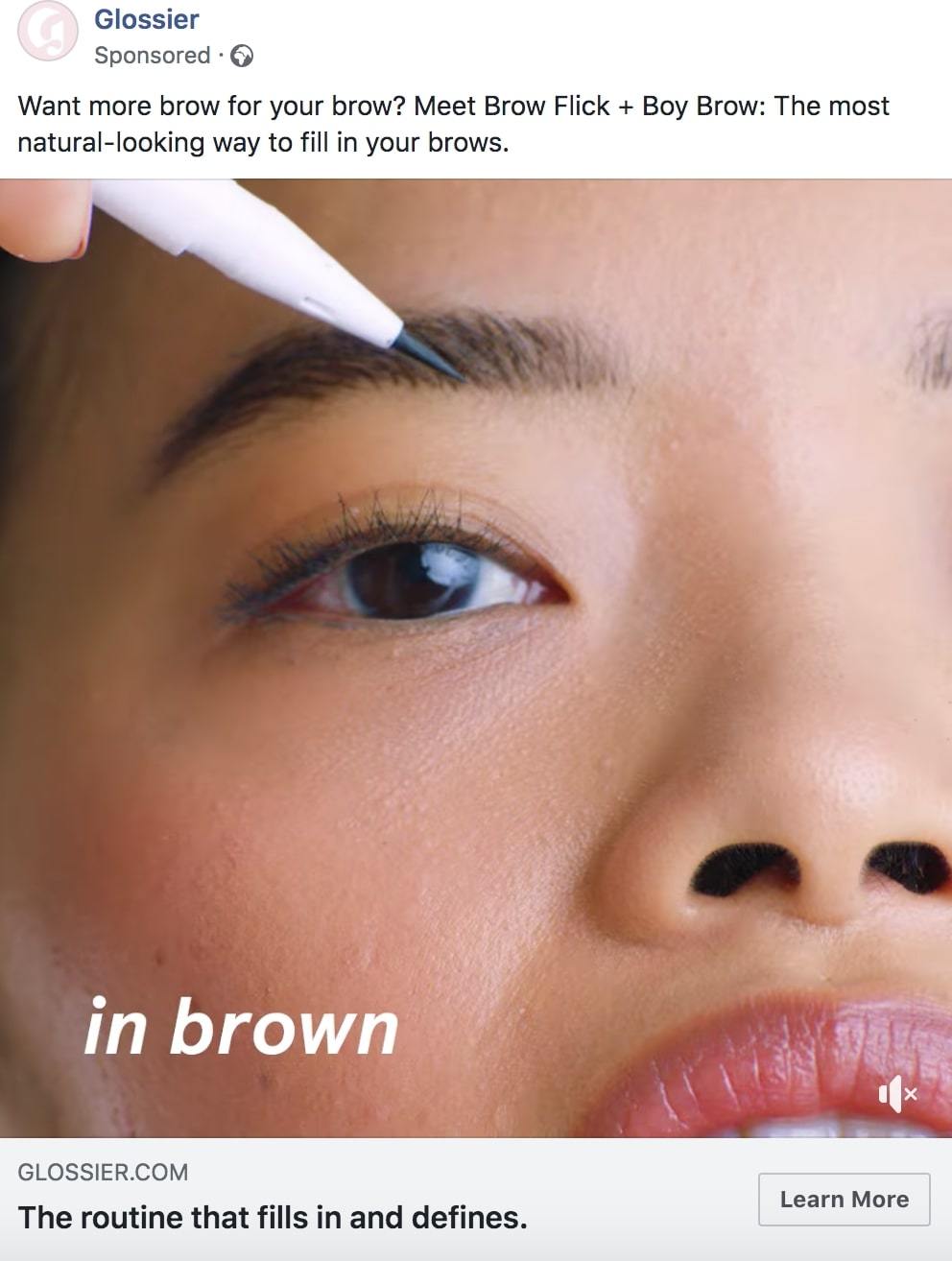
Although each paid advertising platform has its particularities, they mainly all charge for user impressions (how many times your ad is seen), using a metric called CPMs (cost per one thousand impressions).
They also usually allow advertisers to choose who they want to target, based on demographics, interests, and other traits. By using these targeting parameters provided by an online advertising platform, you can narrow in on prospective customers and acquire them through paid ads.
Advantages:
- Fast growth. If you’re looking to rapidly scale your business, some would argue the quickest way to do it is by paying for traffic. Your business is guaranteed to get exposure, and with the right strategy and optimization techniques, businesses have been able to quickly increase their budget to acquire customers rapidly.
- Targeting abilities. One of the great advantages of paid ads is the ability to choose exactly who your ads are shown to. With Facebook ads, for example, you can use Interest and Behavior targeting to reach practically any unique niche based on user behavior on the platform.
Potential pitfalls:
- Expensive. There is an ongoing discussion about rising CPM costs year-over-year on popular online ad platforms like Facebook. Forbes reports Facebook ad costs have increased by 89%, and TikTok’s CPM has increased by 92%.
- Learning curve. Running paid ads isn’t rocket science, but the intricacies of the platform might be enough to intimidate those without experience.
Good for:
- Businesses with a budget. Most advertising platforms don’t require upfront payments or minimum spends to access their audiences, but that doesn’t mean they’re cheap. Being successful at paid ads requires testing different creative variations, audiences, and overall strategy in order to be profitable, so those who have some money to invest in marketing will benefit long term.
- Businesses with creative assets. One of the key factors to success with paid ads is having the right creative that can attract new customers to your business. If your brand has an archive of photos, videos, and copy that can successfully introduce new people to your product and convert them into paying customers, you might want to consider putting some money behind them.
2. Partner with influencers
If you have a marketing budget, one of the quickest ways to get your product or brand in front of a relevant audience is by paying someone with an online following to promote it for you.
Influencer marketing (through Instagrammers, YouTubers, bloggers, TikTokers, etc.) has become a popular form of online advertising, even rivaling referrals from real-life friends.
The success of influencer marketing involves finding the right influencers to promote your product. The challenge is identifying those who have an active, engaged following that would be interested in your product, as well as the creative ability to produce content that reflects well on your brand.
Here's an example of influencer marketing from Doe Lashes. The shares influencer content its Instagram Stories to lend credibility to its products.

Advantages:
- Brand awareness. With hundreds of thousands or even millions of followers, working with large influencers can bring people into your customer acquisition funnel through brand awareness. With influencer marketing, you are not only paying to acquire new customers but also to have your product exposed to a wider audience so that when they are in the market for your particular product, it’s top of mind.
- Niche targeting. A micro-influencer, typically someone with a smaller, more dedicated following, can give businesses with niche products immediate access to a relevant online audience. These micro-influencers typically cost less to work with and have better engagement metrics, which means your sponsored content is more likely to get noticed by their followers and lead to a higher conversion rate of customers.
Potential pitfalls:
- Tracking ROI. One of the shortcomings of using influencers as a paid marketing channel is the lack of extensive tracking that most social platforms have for sponsorships. With Shopify Collabs, you can easily track your affiliate campaign performances from within the Shopify admin. While other paid advertising platforms can track those who view or click on your ads, most influencer posts need to be tracked through UTM links, discount codes, and other creative mechanisms. Without intentionally tracking them, you run the risk of not knowing whether a sponsorship produced sales or not.
- Upfront payments. There are various platforms and experts that can connect your brand or business with influencers who will promote your product. Most of the time, a creator will ask for an upfront payment in the form of money or a product donation.
Good for:
- Products that require demonstration. Say you have a new, innovative product that the average consumer isn’t familiar with. By working with an influencer, you can have them test out, demo, or provide validation for your product that can be shared online to help convince prospective customers.
- Trendy brands or products. Oftentimes influencers are looked up to for their ability to discover new products or trends, whether it be in fashion, food, or technology. If your business or brand has that “cool” factor, approaching an influencer with the opportunity to advertise your product might be more appealing.
3. Run email marketing campaigns
Lead generation is often the first step to customer acquisition. Generating leads involves collecting information from potential customers in order to nurture them or retarget them with ads to eventually convert them into a customer. Most first-time visitors to your site probably won’t buy on the spot, after all.
Collecting email addresses is seen as one of the best lead generation investments for customer acquisition because of the revenue that email marketing produces for businesses.
There are plenty of ways to build an email list, from driving paid traffic to a page with an email capture form to offering a welcome discount on your website for new subscribers.
100% Pure uses a website pop-up to collect emails and connect with subscribers. The brand reports driving 20% of revenue with email.
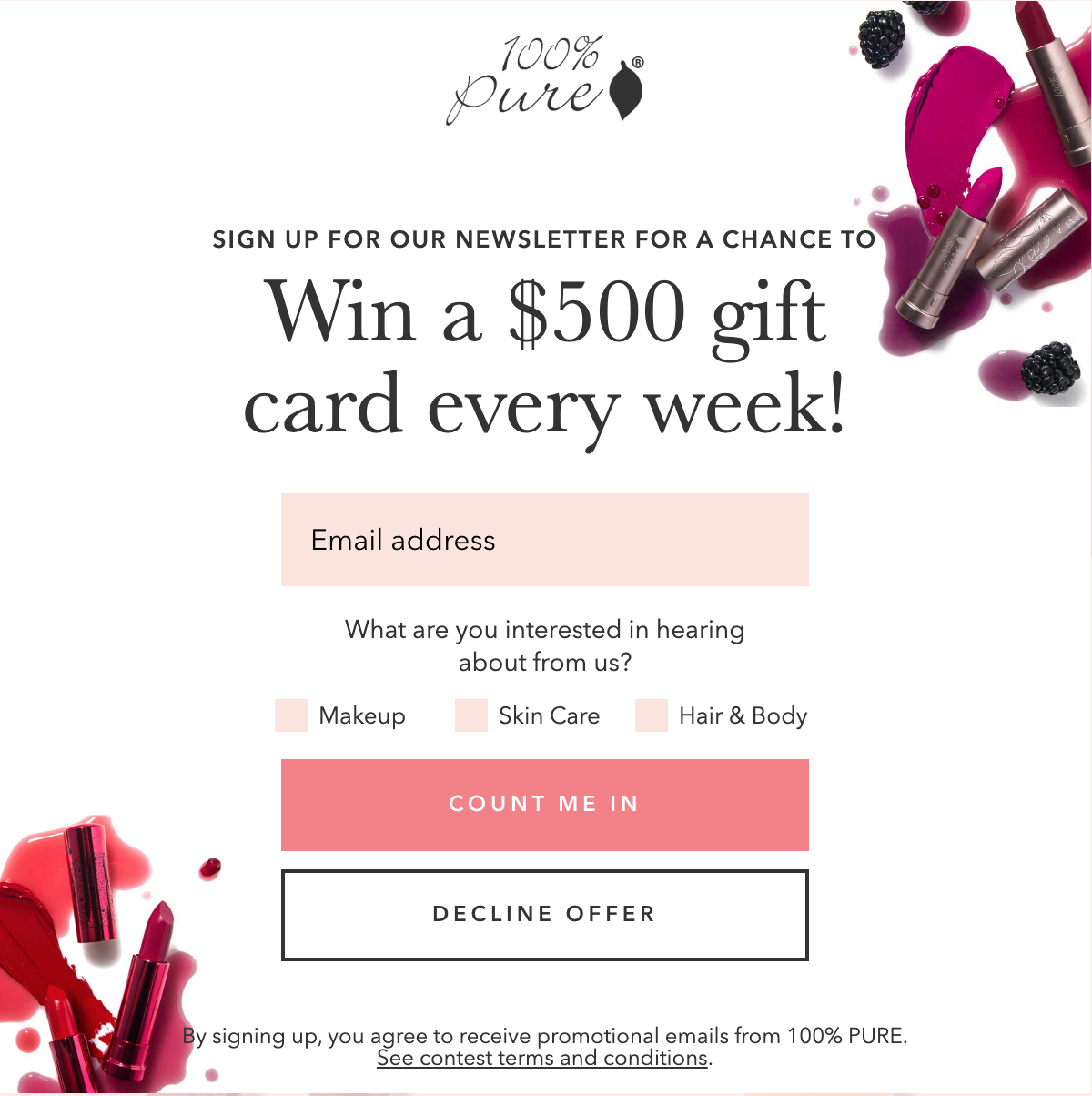
Once your email list is built, you can run email campaigns and set up automated emails to send targeted messages to your list through email marketing services like Klaviyo. These emails can be personalized and triggered based on behavioral data to help you turn leads into customers.
Advantages:
- Recurring revenue. One of the biggest benefits to building an email list is that it gives you the ability to market to customers over a long period of time, extending the lifetime value of each customer acquired. Once the email is collected, you can set up email automation to continue engaging the customer and recommending new products.
- Customer data. Aside from nurturing prospective customers, an email list can also help you find new prospects using “lookalike audiences.” Lookalike audiences are a tool provided by advertising platforms like Facebook and Google, where an advertiser can upload a CSV of emails they collected to find users who “look like” the business’s existing leads.
Potential pitfalls:
- Delivery rates. As spam filters become more sophisticated, getting your emails delivered to someone’s inbox has become increasingly difficult for brands. Personalizing your email communications and following best practices when it comes to email design can help improve the deliverability of your campaigns.
- Low-quality emails. Although a large email list sounds great, quality always overrides quantity. Although some email acquisition tactics may be working, it is important to analyze the conversion rate from each email source to make sure you are acquiring quality leads. One way to decrease your email marketing costs is by regularly cleaning your list of those who haven’t opened an email from you in a long time, otherwise known as your “unengaged list.”
Good for:
- Businesses with multiple/consumable products. If your product is consumable, and therefore needs to be replenished (like coffee), or if you have a line of complementary products (like clothing), email can become your biggest source of recurring revenue.
- New product launches. If you’re still in the product development stage of creating your business, collecting emails can help you prepare for a successful launch.
4. Start a referral program
A personal recommendation from someone you know goes a long way. People trust those they know, so when a friend tells them to check out a new product or brand, they listen.
In order to use referrals as a new customer acquisition strategy, it is up to the business owner to make it easier for those loyal customers to recruit their friends.
This can be achieved by setting up a referral program in which your existing customers are rewarded each time they get someone new to purchase from your business.
Apps like ReferralCandy, LoyaltyLion, and Smile.io all offer ways to encourage customers to refer friends through marketing emails, discounts, and incentives for both the customer and their new recruit.
For example, Skin O2’s referral program encourages customers to refer friends to receive coupons.
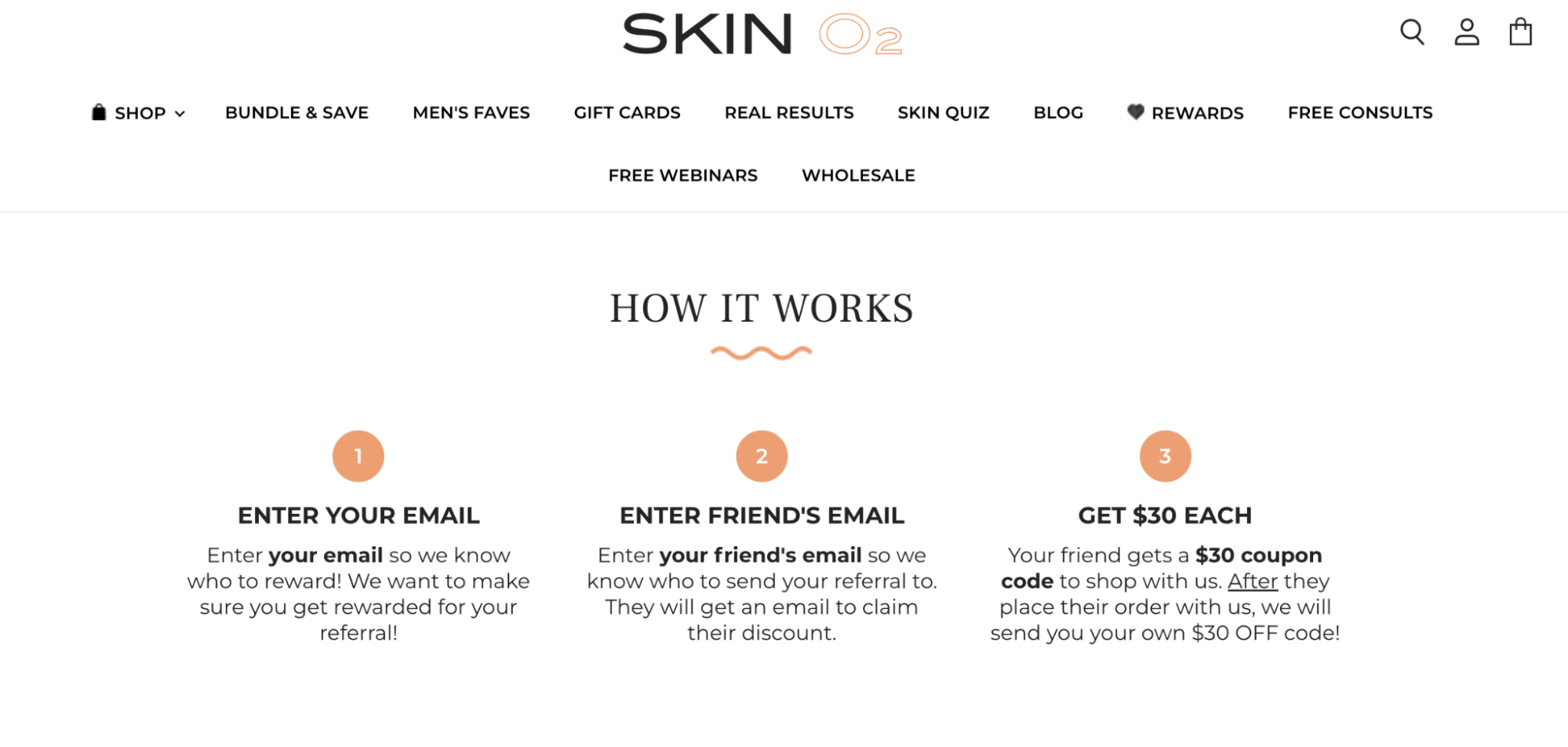
Advantages:
- Low cost. Since personal referrals are so effective, using a referral program is usually seen as a low-cost form of new customer acquisition. The fees associated with setting up a program include a subscription to a referral program app and the discounts given to the new customers who are recruited.
- Repeat purchases. Often when a customer refers a friend, they are rewarded with a small perk, like a discount code off their next purchase. This creates the added benefit of encouraging repeat purchases from existing customers—an extra boost in revenue that can help make your referral program even more profitable.
Potential pitfalls:
- Low engagement. There is no guarantee your customers will want to participate. If your customers haven’t received good service from your business or aren’t in love with your products enough to recommend them, a referral program might not be the right customer acquisition channel for you.
- Organization and tracking. Since referral programs can involve creating customer rewards, tracking who has referred customers, and even loyalty points for each customer, staying organized is an essential part of making the program run smoothly.
Good for:
- Businesses with existing customers. It goes without saying that to run a successful referral program, a business needs to have an existing customer base to work with. If you have a low number of existing customers, their referrals may not even cover the cost of setting up a referral program.
- Businesses with loyal customers. While every business wants to have loyal, engaged customers who would love to share your products with their friends, not all are strategically designed to do this. Having good customer service, quick delivery, and easy returns all help create more loyal customers who are willing to refer their friends.
5. Invest in traditional advertising
Harvard Business Review reports that consumer-facing companies are leading the shift to traditional advertising, predicting an 11.7% increase in spend over the next 12.
With the ubiquity of display ads, digital marketing efforts have become easier for consumers to ignore or opt out of through ad blockers. Traditional media, from small scale efforts like printed flyers to billboards and even TV ads, can be a good way to diversify your customer acquisition channels to reach a new, targeted audience.

At the same time, technology has made significant improvements to both the costs and accessibility of traditional advertising methods for small businesses. There are now apps like Touchcard that can connect to your online store and use customer data to send out physical postcards to your leads or customers.
Advantages:
- Consumer trust. The trust that consumers have in digital ads has increased over time, especially as more well-known brands begin running online campaigns. However, print and TV ads still top the charts when it comes to advertising channels that consumers trust most.
Potential pitfalls:
- Tracking. The flipside of having such a broad reach with traditional advertising is the lack of precision tracking that exists with digital channels. When running a print or TV campaign, it is likely not possible to always know the precise ROI from a campaign, since those who view or take action after seeing your ads aren’t “cookied” like they are when they visit your website directly.
- Upfront investment. The budget commitment and lack of flexibility inherent to traditional advertising are often seen as risky. Digital programmatic advertising allows businesses to pivot and reinvest based on real-time results from their campaigns and learn what works on a smaller-scale budget. If you haven’t tested your marketing message in a more flexible environment first, the upfront investment of traditional media could leave you with disappointing results.
Good for:
- Local businesses. With traditional advertising bearing a heavy upfront fee, efficiencies in these channels might be found with local print, TV, and radio ads. If your business can only ship to a specific state or is designed for a local audience, like celebrating a city’s sports team, advertising in local media can reward you with low-cost reach while still being highly targeted.
- Businesses with high-priced products. Average order value plays a significant role when it comes to high-priced media. If your order value is high and your profit margins strong, the risk of spending on big-budget traditional ads can be offset by the need for fewer purchases to be profitable.
6. Improve your search engine visibility
When looking for a product or service, many consumers begin their search with Google. Creating website content that helps your brand show up in Google search results for relevant queries is known as SEO, or search engine optimization.
Doing keyword research and implementing your findings into a content strategy for your website pages and blog can help you climb Google’s rankings, bringing search traffic filled with potential customers to your website.
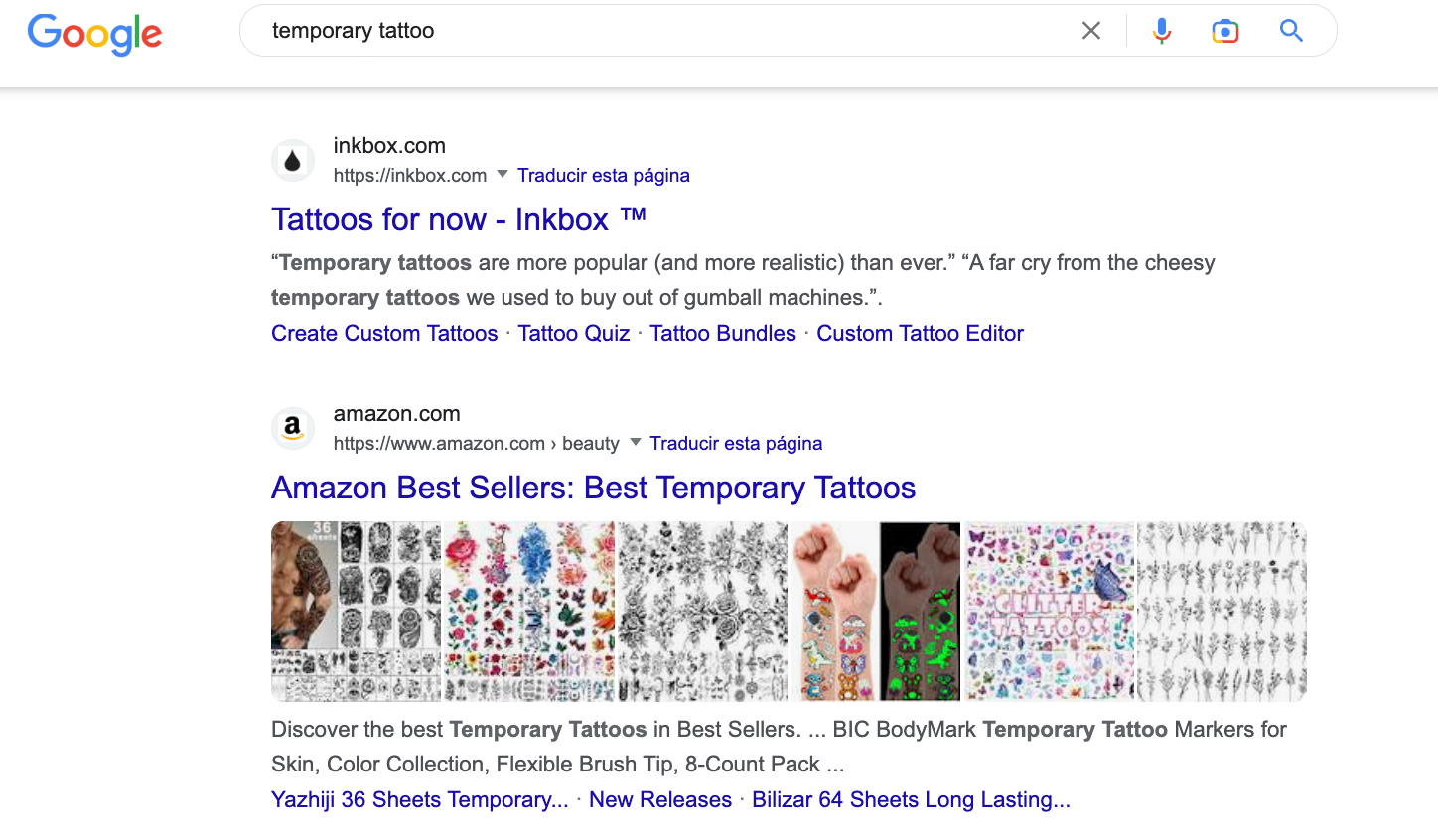
Inkbox ranks first for “temporary tattoos,” a term that has more than 246,000 monthly searches. You can imagine the passive, intentional traffic this generates for its website every day.
Advantages:
- Passive, organic traffic. Every second, more than 99,000 queries are entered into Google’s search engine, making it the most visited site on the web. If you can optimize your website and content toward this goal, you can capture a small percentage of those searching for products in your niche and successfully acquire them as customers.
- Evergreen. SEO is often referred to as a source of “evergreen” traffic, since content created and posted months or even years ago can continue to rank on the first page of Google and drive traffic to your site. A good piece of evergreen content can bring your website new traffic without the need to continuously pay for every new visitor.
Potential pitfalls:
- Slow growth. If you want to show up first on Google’s search results, you can pay with Google Ads to be the first sponsored link visitors see. However, if you are aiming to show up organically on the first page, it can often take time and patience for Google to recognize your website as an authoritative source.
- Competition. Even though the term “temporary tattoos” has more than 30,000 monthly searches, Google displays over 237 million results for it. Certain niches are highly competitive when it comes to search rankings, which can make ranking on the first page more difficult. Tools like Ubersuggest and Ahrefs can help you understand the level of competition for different search queries and keywords and provide ideas for less competitive alternatives.
Good for:
- Those willing to play the long game. SEO done right is a measurable and reliable source of organic traffic, but being successful requires a consistent effort and constant learning. The Google algorithm is prone to change, and staying on top of the latest strategies on both the technical and creative side of SEO is essential to making this channel work.
- Content creators. While SEO may seem quite technical, it is widely known that the quality of a website’s content to satisfy searchers plays a critical role in its ability to rank in Google search results. The ability to write well and come up with creative content ideas that align with your keyword research can help rank your content above the competition.
By focusing on your SEO, you’ll be able to improve the ranking of your product or service on search engines, which will make you more visible to your prospective and existing customer base. Use industry-related keywords as well as backlinks from reputable websites to increase your brand awareness.
7. Focus on audience building
With social media and its many platforms like Facebook, Instagram, YouTube, and Twitch, individuals have been able to attract huge online followings of potential customers.
Companies like Gymshark have cultivated TikTok followings in the millions, becoming influencers themselves.
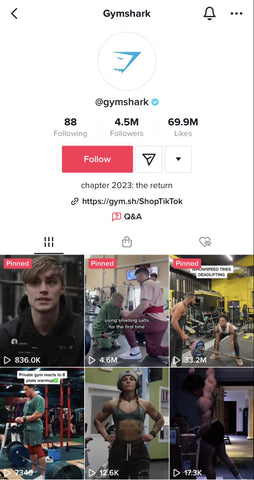
Gymshark has over four million followers on TikTok and built a community of brand ambassadors who promote it on the platform.
There are several ways to build an online audience on social media. Almost all of them require time, consistency, and content to attract new followers and keep them engaged. Your online following not only lends your brand authority, it also creates an audience of customers you can reach whenever you want to promote a new product or increase sales.
Advantages:
- Organic traffic. Although there might be costs associated with creating an engaging social media account, it is often seen as a source of organic traffic, since it can help share your content for free. Viral videos can show up on the highly trafficked trending or discover page of different platforms, and your followers can share your content or tag your brand, bringing you more organic followers and potential customers.
- Social proof. Social media has no shortage of visible numbers. Whether it’s the number of likes or comments a photo gets or your total subscribers, all of these metrics lend authority to your brand in the form of social proof. When potential customers decide to check your brand out online (which they often do), the size of your online audience and its engagement adds to its legitimacy.
Potential pitfalls:
- Slow growth. If creating an online audience was easy, everyone would be an influencer. Building an organic following and turning it into a customer acquisition channel takes time, especially in contrast to paid advertising.
- Algorithm changes. One of the biggest threats to content creators on any platform is a sudden change in the algorithm that once helped them gain traction. If you decide to build an online audience, your ability to reach that audience and convert them into customers will always be controlled in some part by the platform itself.
Good for:
- Content creators. If you’re the creative type who is skilled in the area of writing, photography, video, or just generally entertaining people online, building an online audience as a form of customer acquisition might be a good use of your skills.
- Businesses on a budget. If you’re strapped for cash, creating an online audience organically can be a cost-effective way to attract new customers. Unlike paid ads, there isn’t a fixed cost associated with exposing your brand to new people. Rather than dollars alone, online audiences can be built on your own creativity.
8. Start a blog
A thoughtful and interesting blogging strategy can build trust with potential customers, nurture customer relationships, and promote your products and services.
Brands like Press, which sells plant-based goods like juice cleanses and kombucha, shares tips for healthy living and educational content through its blog, The Squeeze.
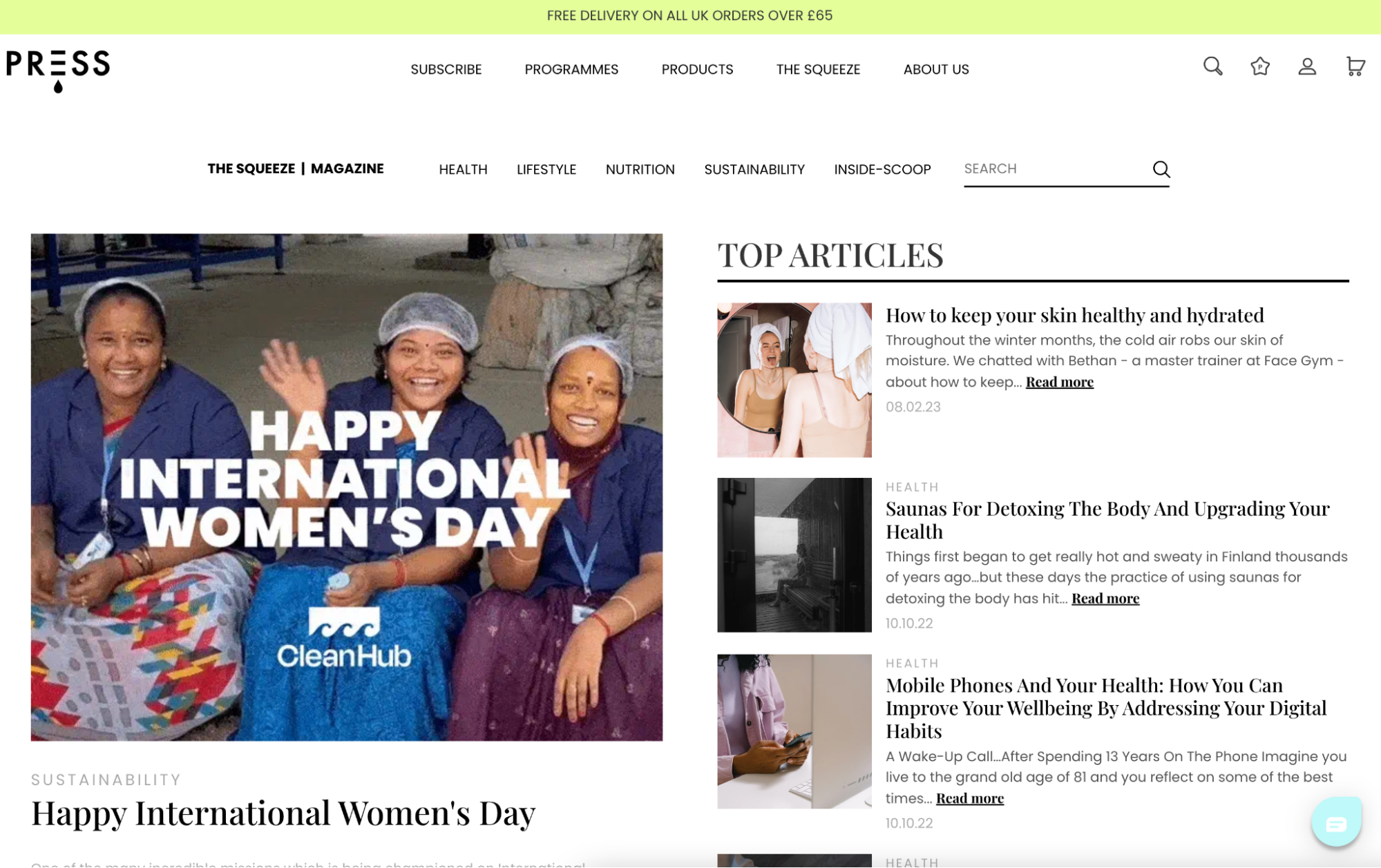
The blog has a simple yet eye-catching design, with hero images that reflect its products. Posts are full of useful, well-researched information and expert interviews that help readers make healthier life choices. Squeeze also offers resources like a direct line to its in-house nutritionist at the bottom of articles.
Advantages:
- Builds trust with customers. Sharing reputable and useful information helps readers solve their problems. This builds trust between them and your business. If someone trusts you, they are more likely to accept your recommendations.
- Generates leads. Traffic aside, content marketing helps generate leads for your business. When someone visits a page from your social media account or Google and likes your content, they may click on your call to action and convert. Many ecommerce platforms make it easy to create a blog for your online store.
Potential pitfalls:
- It takes upfront investment. Running a blog is not cheap. You need a team of strategists, writers, editors, and project managers to make it happen. It may also take time for your content to show up in search results. Regardless, you can always share it on social media for free.
- It needs to be done right. Adding a blog is a good investment if you publish high-quality material. Poorly formatted, researched, and written content can deter visitors from your website.
Good for:
- Those willing to invest in quality content. Blogs can provide many benefits for your online business, but only if it’s done with care and effort. Simply publishing a few posts each month won’t get the traffic or conversions you hope for.
Calculating customer acquisition cost (CAC)
Almost every new customer comes with a cost that can be calculated based on the marketing effort put forth to acquire them. To know whether your customer acquisition efforts are working, you will need to understand how to calculate your customer acquisition costs (CAC).
Your customer acquisition cost is the total cost of marketing divided by the number of customers acquired.
For example, say your Instagram page brings in 50 customers a month and you spend $500 creating content. Your customer acquisition cost would be $10:
marketing spend ($500) / new customers ($50) = CAC ($10 per customer)
The reason businesses calculate their customer acquisition cost is to understand if their marketing approach is profitable. Using the above example, if each customer is spending $50 on average on their first purchase from your business and your gross margin on each order is 50%, your profit would be $15 on each order.
average order value ($50) x gross margin (50%) - customer acquisition cost ($10) = profit ($15)
For brands with a higher customer lifetime value (LTV), it may even make business sense for their customer acquisition cost to not be profitable on the first purchase. If your customer data tells you that the customers you acquire will likely continue buying from your brand after their initial purchase, you may be able to afford to spend more to acquire each new customer.
By using Google Analytics, Shopify Reports, and other tracking/reporting tools, it’s possible to know your customer acquisition cost for each marketing initiative. Experimenting with different customer acquisition and retention strategies, and attributing the results, is the key to unlocking new ways to grow your business.
Customer acquisition tools
Referral Candy
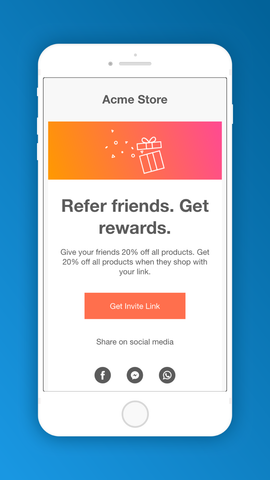
Referral Candy is a tool for building referral programs for your store. More than 3,000 Shopify merchants use it to reach new customers, grow their brand through word of mouth, and create fun and engaging customer loyalty programs. It works across any industry: fashion, athleisure, nutrition, electronics, and more.
Referral Candy offers tools to automate your referral programs and acquire new customers, like post-purchase pop-ups and VIP rewards. It also connects with your favorite marketing tools like Klaviyo, Facebook, Google Ads, and more.
Pricing starts at $59 per month for the service.
Shopify Inbox

Shopify Inbox is a free Shopify app that helps you turn browsers into buyers through the power of chat. Right from your Shopify admin you can customize your online store chat, create automated messages, and get insights to understand how your chat is performing.
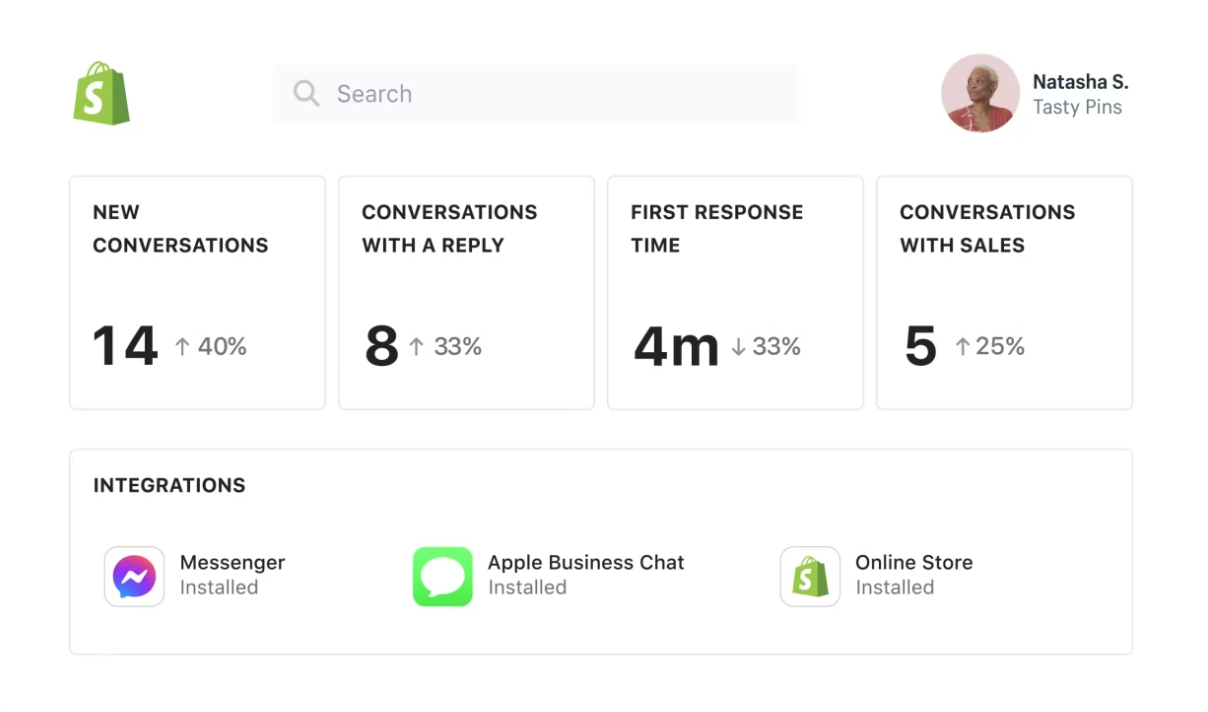
With Shopify Inbox, you can:
- Save time managing customer conversations from online store chat and social media, all within one app
- Send products and discounts from your Shopify store directly inside chats with just a few taps, turning conversations into checkouts
- Know when customers add or remove items from their shopping cart
- Assign chats to your staff and team to scale customer conversations
It also connects with popular messaging platforms like Messenger and Apple Business Chat, so you can help more people, in less time, on their preferred channel.
Shopify Messaging
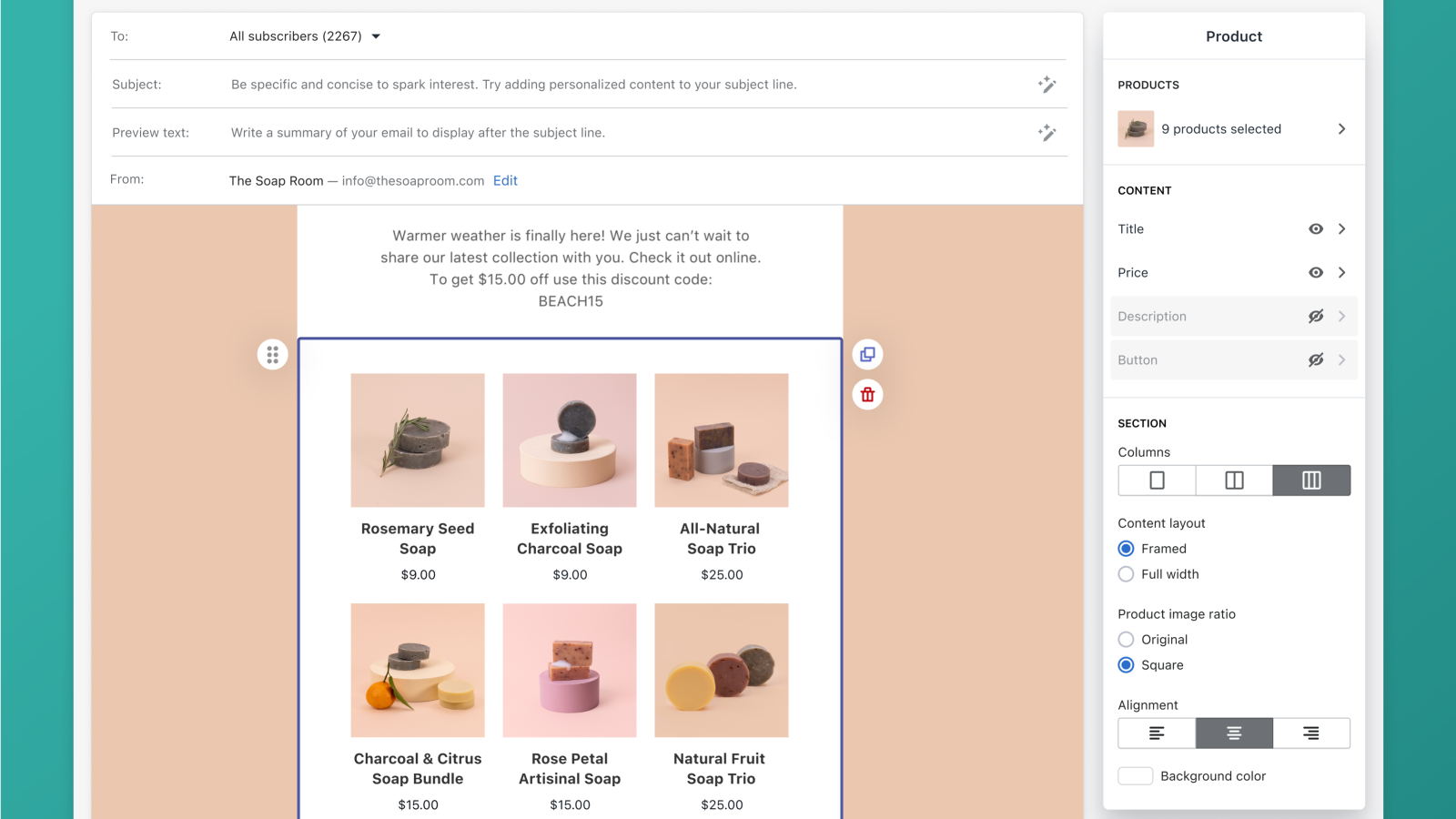
Shopify Messaging is the email marketing app made for ecommerce stores. You can easily design emails in minutes with a drag-and-drop editor, creating beautiful, branded emails to send to your list. No coding experience required.
The best part? You can manage all campaigns in your Shopify admin. Shopify email also lets you:
- Choose from a growing collection of templates, like product collections, sales, restock, newsletters, holidays, events, and more
- Personalize your content with customers’ information for a more engaging experience
- Schedule emails to send at a specific time
- Segment emails to send the right message to the right person
- Track metrics such as open and click-through rates, products added to carts, and purchases
You also get 2,500 emails for free each month, then pay $1 for every 1,000 emails you send after that.
Privy
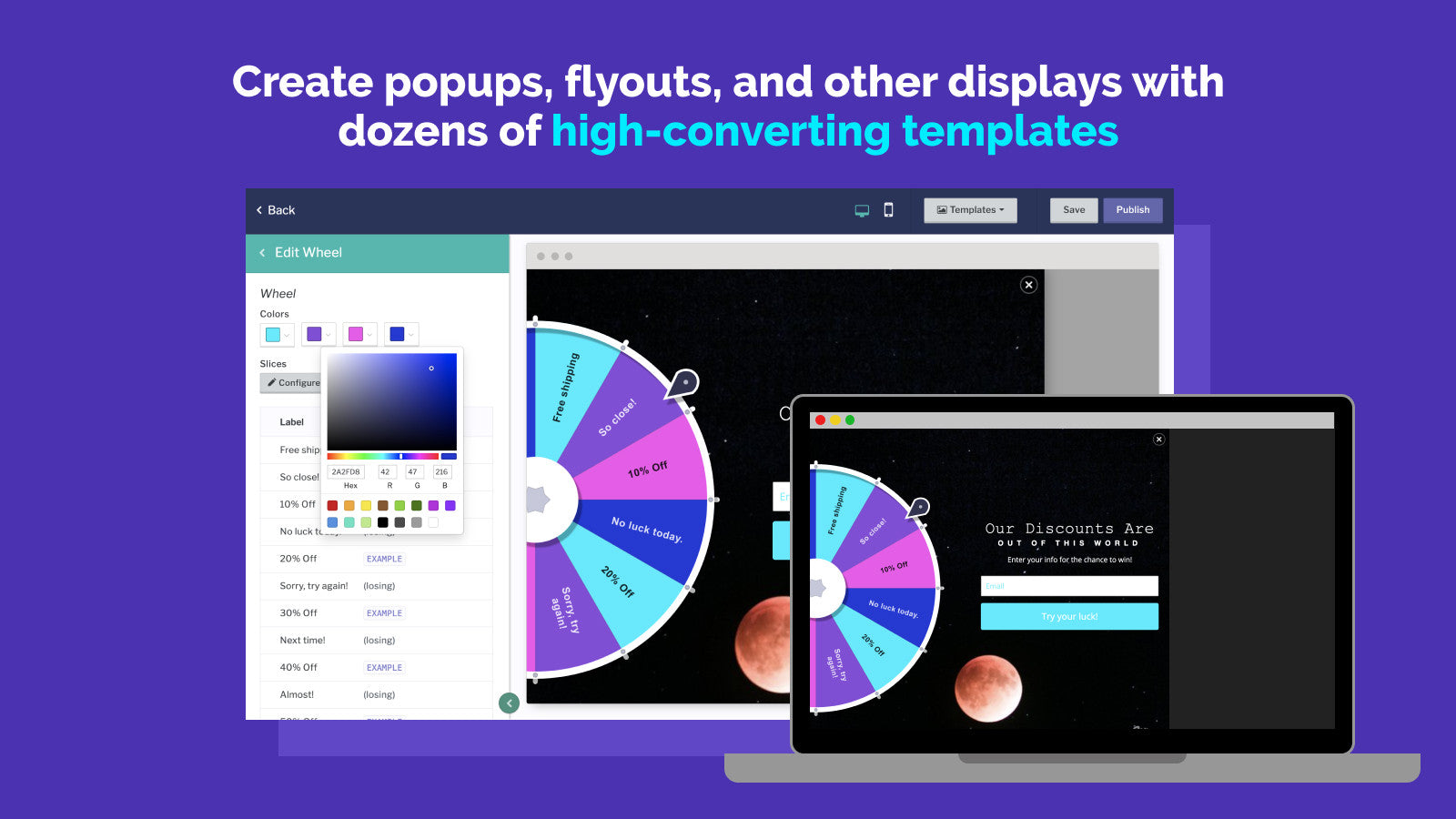
Privy is a popular Shopify app, with more than 24,800 reviews. This plug-in is trusted by businesses large and small to improve conversions, grow subscriber lists, and make more sales. Privy offers tools for conversion, email marketing, and website widgets like:
- Pop-ups
- Spin-to-win wheels
- Cart savers
- Free shipping and sign-up bars
- Banners
- Flyouts
- Embedded forms
Privy offers a free 15-day trial. Paid plans start at $30/month.
Booster SEO & Image Optimizer

SEO isn’t easy to manage for many small businesses. Fortunately, Booster SEO & Image Optimizer is here to make it easier.
The only SEO app built exclusively for Shopify stores, this app ensures your store is optimized for search engines 24/7. Use it to optimize image alt tags, create effective meta tags, create enriched listings, and fix SEO issues on autopilot.
Paid plans start at $39/month.
Creating a successful customer acquisition strategy
While reducing churn and repeat purchases are an important element to the overall health of your new business, attracting new customers through customer acquisition can help you grow beyond your current base.
Customer acquisition is about demystifying how customers discover your brand and why they buy from you, so you can improve the customer experience. This will allow you to spend your marketing dollars more strategically, improve customer lifetime value, and grow your business steadily over time.
Knowing which channels will work as a customer acquisition tool for your business involves continuously testing new channels and approaches, letting you find out what works best for your unique business and preventing you from being too reliant on a single source.
Read more
- The 13 Best Dropshipping Suppliers in 2024
- 130+ Dropshipping Products To Sell for Profit
- A 14-Point Ecommerce Checklist to Launch Your Shopify Store
- How To Source Products To Sell Online
- Competitive Analysis Can Grow Revenue—Here’s How
- What is Customer Acquisition Cost? Calculate and Reduce It
- How to Start a Blogging Business in 2024 (Beginner's Guide)
- 17 Ways to Get More Followers on Instagram (2024)
- Creators in Control- How YouTubers Can Make Money With Merch
- Co-Marketing- How to Reach New Customers With Strategic Partnerships
Customer acquisition FAQ
What are the three parts of customer acquisition?
- Top funnel
- Mid-funnel
- Bottom funnel




